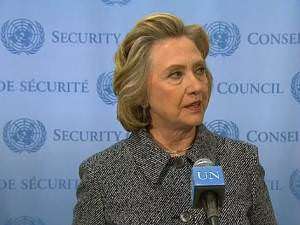The Clinton Foundation's Dubious Foreign Dealings

Over the past few months, as Hillary Clinton's presidential campaign has ramped up, we've seen a number of stories raise questions about the relationship between the Clinton Foundation and foreign governments.
In February, The Washington Post reported that the foundation had "accepted millions of dollars from seven foreign governments during Hillary Rodham Clinton's tenure as secretary of state, including one donation that violated its ethics agreement with the Obama administration." The next month, Rueters reported that the foundation had failed to disclose several foreign donors to its biggest program, in violation of an ethics agreement that had been made with the administration coinciding with Hillary Clinton's State Department tenure. Last week, The Wall Street Journal reported that, despite increased scrutiny of the foundation's foreign ties, the foundation would continue accepting donations from a half dozen foreign nations.
Expect these stories not only to continue but to intensify over the next few months. Clinton Cash: The Untold Story of How and Why Foreign Governments and Businesses Helped Make Bill and Hillary Rich, a soon-to-be-released book on the Clinton family's foreign connections, purports to demonstrate "a pattern of financial transactions involving the Clintons that occurred contemporaneous with favorable U.S. policy decisions benefiting those providing the funds," according to author Peter Schweizer.
According to The New York Times, which got an advance copy (more on that in a moment), Schweizer's book "asserts that foreign entities who made payments to the Clinton Foundation and to Mr. Clinton through high speaking fees received favors from Mrs. Clinton's State Department in return." Some specifics, via the Times:
His examples include a free-trade agreement in Colombia that benefited a major foundation donor's natural resource investments in the South American nation, development projects in the aftermath of the Haitian earthquake in 2010, and more than $1 million in payments to Mr. Clinton by a Canadian bank and major shareholder in the Keystone XL oil pipeline around the time the project was being debated in the State Department.
On the surface, it doesn't look good.
But of course the book isn't out yet, so it's not clear exactly what Schweizer's got. But there are hints that he has the goods. One telling detail in the Times piece is that "major news organizations including The Times, The Washington Post and Fox News have exclusive agreements with the author to pursue the story lines found in the book." The fact that these organizations have agreed to such a deal probably means that they've seen some of the documentation Schweizer has, even beyond what's in the text of the book, and found it compelling. (Politico has more on the deals with news organizations.)
One thing this means is that the story isn't going to go away. Major news organizations, which have already been digging through the Clinton Foundation's foreign dealings, are going to follow up on and expand upon Schweizer's reporting.
And whatever that reporting turns up, the very fact that the story is in the news is going to reinforce the existing impression amongst many that the Clintons as vaguely corrupt, secretive, powerful elites who are frequently involved in legally and ethically dubious deals.


Show Comments (183)